I have been investigating whether Brian Simmons, in his so-called ‘Passion Translation’ of the holy scriptures, has really translated from the Aramaic when he says he has.
Simmons claims to be translating from the original languages. In the FAQs at the ‘Passion Translation’ website, it is stated (FAQ: ‘What process was used…’) that:
Dr. Simmons engaged a three-stage process for bringing the original languages into modern English. First, he analyzed the passage in the original biblical language to establish its meaning.
Further (FAQ: ‘What textual source materials were used…’), it is claimed that this is:
an entirely new, fresh translation from the original Hebrew, Greek, and Aramaic documents.
For the New Testament, Simmons used Nestle-Aland (27th ed.):
as his Greek base text from which to work, while incorporating insights from the Syriac (Aramaic) Peshitta, as well as the Roth text.
As I have previously pointed out, ‘the Roth text’ is itself an edition of the Peshitta, not something other than the Peshitta, as Simmons implies.
Which edition of the Peshitta text was used?
Simmons does not tell us which Peshitta text or texts he is using. This highly unusual for a translator, if not unheard of. Here for example is James Murdock in 1858 detailing the editions of the Peshitta text which he employed:
J. W. Etheridge, in 1849, is somewhat less explicit, but still gives an indication (at p. 32) of the editions that he is using:
Or to take a recent example, Janet Magiera in 2005 states (p. 7) that she is using the United Bible Societies’ ‘The Syriac New Testament and Psalms’:
But in Simmons’ ‘Letters from Heaven‘, in the ‘Translator’s Introduction’ where one would expect to find such information, there is only a further implied claim that he has been translating from the original text, without any indication of which edition of it he has been using:
An exchange with Brian Simmons on Facebook
On 6 March, on the ‘Passion Translation’ Facebook page, I questioned the accuracy of Simmons’ rendition of Galatians 3.1, and especially its final sentence, of which I could find no sign in the Peshitta 1:
In reply, Brian Simmons seemed to assume that I had been looking in George Lamsa’s translation from the Peshitta, and recommended three alternative English translations (or so-called translations in one or more cases), namely those of Victor Alexander, Dave Bauscher, and Andrew Roth:
This strikes me as an odd answer, since Brian didn’t say which if any of these editions had a sentence similar to the one I was looking for. All three links were to books that required purchasing. Did he intend that I purchase all three to look for the missing words?
Also, I found it strange that he assumed I was looking at Lamsa’s English translation. I was in fact looking at the Peshitta Tool at Dukhrana.com, which has two forms of the Syriac text, along with translations into English by Etheridge, Murdock and Lamsa. Since he says that he is working from the original text, I had rather expected that he answer my question from that text. Accordingly I put the Syriac text in my reply, to encourage him to answer me from it. I also asked him which of the three English translations he had recommended was the one I should be looking at:
In reply, Brian made no reference to the Syriac text, but directed me specifically to Alexander’s work:
After a further look at Alexander’s web-site, I realised that he has in fact put his bible translations (or so-called translations) online. To my great surprise, I discovered that Alexander’s version of Galatians 3.1 offers no support for the sentence I was questioning in Simmons’ version.
Here for reference are the two main forms of the Greek text of Galatians 3.1, along with English translations of each form:
Ὦ ἀνόητοι Γαλάται, τίς ὑμᾶς ἐβάσκανεν, οἷς κατ’ ὀφθαλμοὺς Ἰησοῦς Χριστὸς προεγράφη ἐσταυρωμένος; [SBLGNT]
You foolish Galatians, who has bewitched you, before whose eyes Jesus Christ was publicly portrayed as crucified? [NASB]
ω ανοητοι γαλαται τις υμας εβασκανεν τη αληθεια μη πειθεσθαι οις κατ οφθαλμους ιησους χριστος προεγραφη εν υμιν εσταυρωμενος [Scrivener]
O foolish Galatians! Who has bewitched you that you should not obey the truth, before whose eyes Jesus Christ was clearly portrayed among you as crucified? [NKJV]
Here it is in the ‘Passion Translation’, Kindle Edition:
and here it is in Alexander’s:
There has nothing here about Jesus being revealed as the Manifestation of Wisdom, as Simmons has it. I had asked Simmons where this came from; he referred me to Alexander’s version; but Alexander’s version (at least as he has it online) has nothing like this. I pointed this out to Simmons an hour later:
but received no reply. Where did he get these words from? He says in note b that:
The words, “Manifestation of Wisdom” can also be translated, “Artisan” or “Fashioner” or “Master Craftsman.”
This sounds as if there are some actual Aramaic words which he is looking at. But what are they? And what sort of words would they be which could be translated:
Manifestation of Wisdom
on the one hand, and:
Artisan; Fashioner; Master Craftsman
on the other?
The next day, I pressed him for an explanation of where his sentence came from:
but again received no reply.
‘Joyous expectation’ or ‘seed’?
Having received no explanation from Simmons about 3.1, I changed the subject and asked him about Galatians 3.19, which he ‘translates’ as follows:
In this case, as I have shown in a short post, it is possible to identify the Aramaic word which Simmons claims to have translated ‘literally’ as ‘Joyous Expectation’. The word is ܙܰܪܥܳܐ (zarᶜā); its most literal meaning is ‘seed’; and it can carry (see the same post) the further metaphorical meaning of ‘offspring’, ‘family’ and ‘race’. It does not mean ‘joyous expectation’ or anything like it.
Having been alerted by Simmons himself to the influence of Victor Alexander’s work on the Passion Translation (so-called), I had by now found the source of Simmons’ ‘joyous expectation’ in one of Alexander’s footnotes. He translates ܙܰܪܥܳܐ normally as seed:
but then in a footnote he adds what seems to be a kind of gloss:
The antecedent of ‘To whom’ must be the seed, so that we would have either:
‘until there came the seed that was prophesied, to whom were directed the joyous expectations’
or
‘until there came the seed, to whom were directed the joyous expectations’.
If the former, then the words in the footnote would be a kind of commentary by Alexander. If the latter, they would be his ‘translation’ of the clause that follows ܙܰܪܥܳܐ (zarᶜā), that is, ܗܰܘ ܕ݁ܠܶܗ ܗܘܳܐ ܫܽܘܘ݈ܕ݁ܳܝܳܐ (haw dəlēh həwā šūddāyā), for which a rather literal translation would be something like that of Etheridge (p. 311): ‘of whom was the promise’.
Either way, the words in the footnote are not standing for ܙܰܪܥܳܐ (zarᶜā). At the same time, it is I think obvious, given that Simmons had previously himself referred me to Alexander’s work, that Simmons’ ‘Joyous Expectation’ derives from Alexander’s ‘joyous expectations’.
It appears then that:
a) Simmons, when he claims to be translating from the Aramaic, is actually taking text from English translations of the Aramaic, and even from footnotes to such translations;
b) on this occasion, he either misunderstood where that text belonged in the sentence, or perhaps simply preferred to make it serve a different function in another place in the sentence.
I have to admit that I hadn’t thought the matter through to this extent when I asked the following question of Simmons on 8 March. I simply pointed out that he had taken ‘Joyous Expectation’ from Alexander, and asked him where Alexander in turn had derived it from:
In reply, Simmons did not deny that Alexander was the source of ‘Joyous Expectation’, so I think we can take that as certain. As to where Alexander got his ‘joyous expectations’ from, Simmons believed that it would be from his ‘perspective’ as a present day Aramaic speaker:
Alexander does indeed claim to be fluent in Aramaic and I have little reason to doubt him. While Aramaic speakers are rare among the Assyrian diaspora today, they do exist, and there is nothing too surprising about his claim to have gone to an Aramaic language school as a child, connected with the Presbyterian Church (possibly the Assyrian Evangelical Church, which is Presbyterian?).
But I don’t yet understand Simmons’ point. Let’s say, for sake of argument, that the word ܙܰܪܥܳܐ (zarᶜā) had acquired a new meaning over the last 1600 or 1800 years since the Peshitta was translated from the Greek. People had been planting their seed and thinking with joyous expectation of the harvest to come, and begun to use the word to mean not only the seed but also the feeling that came with it. Would this then justify translating the word as it appears in the Peshitta as ‘joyous expectation’? Not at all, it seems to me. What matters is what the word meant at the time of authorship, not what it might mean now.
Conclusions
I have reluctantly come to the conclusion that Brian Simmons is probably not translating from the Aramaic when he says he is, for three reasons:
- Most of the translations seem to be incorrect, as I have endeavoured to show in my ten posts on Galatians (starting here), as well as my post on Ephesians 5.22, and an early post with a similar title with this one, in that part of it which dealt with Romans 1.9. I find it hard to see how he could have deviated so far from usual translations and the lexical meanings of words if he was working from the Syriac text.
- He fails to tell us what edition of the Peshitta he is translating from.
- When I enquired about particular verses he made reference only to English translations from the Aramaic and not to the original. This remained the case even after I had posted the Syriac text, and made reference to the Peshitta Tool, and thus indicated that I was willing to discuss the original text.
Andrew

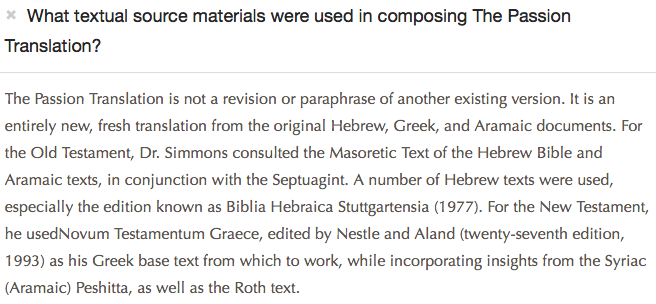
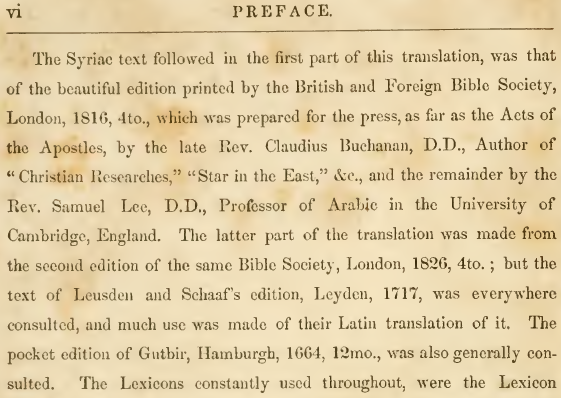






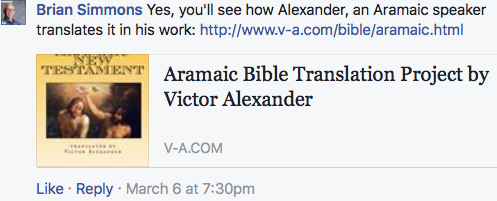
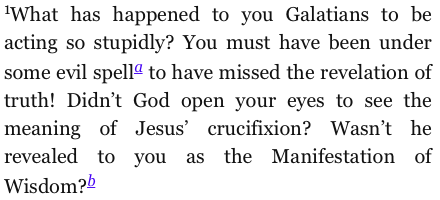
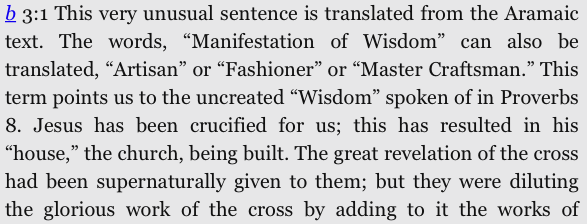





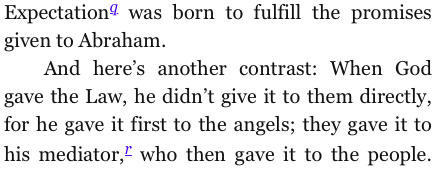





I think you stealthily made a very valid case that \”translations\” ought to be made by those who have the credentials of being experts in the languages that they are working from. They might also have enough English credentials to know just how to express something in that living language. I believe that Simmons lack of scholarship will eventually doom the acceptance of this translation once the newness and fad fade away. Yet, I must say on his behalf that I enjoy the freshness of his English even if he errs in his sources. Perhaps this ought to have been called a “paraphrase” from the beginning rather than be mislabeled as a real translation. Personally, I don\’t think that there have been enough attempts at producing quality paraphrases. When I attended bible college, 30 plus years ago, I learned the major \”theological\” and \”doctrinal\” Greek and Hebrew words. This radically changed my view of translations forever as I realized just how limited any translation was in conveying ideas from one language to another. I have always found the debate over Greek vs Aramaic primacy interesting reading but it has not changed my view about the Lordship of Jesus Christ and his primacy in the church. I hope, despite its deficiencies, that Brian Simmons \”paraphrase\” will point the way to the living Jesus for those who still see Jesus as just a vague historical personage who taught some esoteric gobbly-gook. My greatest sadness is that Bible publishers keep on publishing ancient sounding Bible translation after Bible translation that go virtually unread and un-comprehended by the masses. It seems to me that the profit motive of these publisher has keep many more in ignorance. Thomas Nelson Publishers barely publishes their fine New Century Version any longer choosing instead to publish the awful KJV and the horrible NKJV almost exclusively. My own girlfriend refuses to pick up any other Bible than the KJV. She cannot comprehend what it is saying nor does she read it often because she knows that she can’t understand it! I doubt she could tell you who the prophet Elijah was, or what Jesus said about John the Baptist being Elijah, or even that Mary Magdalene was the first person to see the resurrected Jesus. Alas, when will the Bible stop being hidden by ill-informed corporate boards whose bottom line is only money?
Thanks, Joseph, for your comment, and I am glad that you care about bible translation, and have a heart to see God’s word translated into English in a way that people can understand. Personally, I really like the NKJV, despite its undoubted deficiencies, and use it as my primary English bible, followed by the NASB. For personal reading, I read in the original now, most of the time, despite being slowed up by having to look up some words. The Lord is with you as you seek His wonderful face and meditate on His glorious word. Blessings in the Lord Jesus Christ,
Andrew
This is such a helpful post and your interaction with Simmons was gracious and thorough. Although I am sad that Simmons has presented himself as an aramaic scholar or allowed himself to be presented as such, I am more concerned at the way the footnotes throughout undermine the regular readers’ confidence in other English texts (or baby scholars like me who try to use of the Greek NT with many helps!) without solid evidence or explanation.
Thank you, Megan, for the kind words and encouragement. You raise an important point – if with ‘English texts’ you are referring to other English bible translations, and if I understand you correctly – that Brian Simmons might give his readers the impression that the Greek and Hebrew originals are very vague and imprecise – that they can mean just about anything, so to say, when this is not true at all, Greek especially being a very precise language I think.
Andrew
I appreciate your thoroughness and that you are addressing the text and the source and not casting aspersions on Brian Simmons. Appreciate you doing this.
Thank you so much for your work on this. It hasn’t been long that The Passion Translation has recently been influencing some in my church, and I hadn’t given it much thought until a person asked me what I thought of it. I had noticed Simmon’s possible dodge in answer to a question in an interview about when/how he learned Hebrew and Greek, but these particulars are most helpful. I really appreciate your careful documentation.
Looking back at this a few years later and it appears they’ve changed it in the updated version to “Was he not revealed to you as the crucified one?”
Thanks, Dizzy, I seem to remember that they corrected some of the Alexander-derived verses that I drew attention to. But that was only the tip of a large iceberg and I am not sure that they did a root and branch review.
‘Revealed’ is still wrong. The verb προγράφω means ‘to write before’, ‘proclaim’, ‘portray’, ‘depict’ etc.